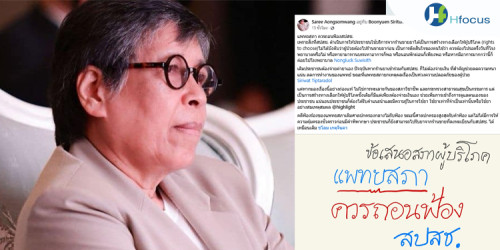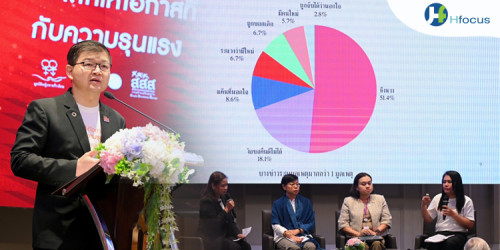
The government will likely limit the budget for its medical insurance schemes this year after healthcare costs ballooned over the past few years.
The freeze on the National Health Security Fund has already caused hardship for some state hospitals as they cannot expand services, acquire advanced equipment or even hire staff to meet growing demand.
This year, nearly Bt200 billion will be spent to operate the three main health insurance plans - the National Health Security Fund (NHSF), Social Security Fund (SSF) and Civil Servant Medical Benefit Fund (CSMBF).
The NHSF will get the lion's share of Bt109 billion, or Bt2,755.60 per head, to serve 48 million people. The SSF will get Bt27 billion, or Bt2,500 per head, to serve 11 million subscribers, and the CSMBF Bt60 billion, or about Bt12,000 per head, for 5 million bureaucrats and their families.
Among the three national welfare funds, the CSMBF enjoys the biggest healthcare budget.
During the past three years, the government tried to limit the budget for the schemes, but their health expenses rose drastically and were not reduced to a satisfactory level.
The government tried to clamp down on the CSMBF by controlling expenses for glucosamine sulphate, which is used to treat arthritis. A regulation issued last year succeeded in cutting glucosamine reimbursements from Bt600 million to Bt10 million.
This year, the government plans to implement more measures to limit the CSMBF's total budget to Bt60 billion.
The government will also rein in the NHSF by keeping its per-head budget at Bt2,755.60 for three years from 2012-14.
"The government did not give us a clear answer for why it had to cut the budget," Dr Winai Swasdivorn, secretary-general of the National Health Security Office, said yesterday.
"It might have its own reasons. Maybe it wants to spend more on other things rather than healthcare," he said.
The healthcare budget for the NHSF has been ramping up dramatically, averaging 10 per cent each year, he said. The NHSF's per capita healthcare budget rose from Bt1,200 in 2002 to Bt2,755.60 last year.
Healthcare costs are accelerating faster than gross domestic product (GDP). They now account for 12-13 per cent of the government's total expenditures.
Only 32.8 million of the 48 million people covered by the NHSF have received medical services under the universal healthcare scheme.
However, the government's measure to contain the NHSF's budget would not affect medical services under the universal healthcare scheme. It might affect the government's expenditures instead, Winai added.
Public Health Minister Pradit Sinthawanarong said the budget cap for the NHSF would not undermine the quality of medical services.
"We'll adjust mindsets and improve work processes to become more effective," he said.
The government will implement measures to curb the exploding cost of healthcare schemes, such as managing human resources, managing medical services like the private sector, increasing income for the NHSF by providing medical services for 400,000 local administration officials and migrant workers, and creating a centre of excellence in medical care.
Due to the tight budget, hospitals must learn to share medical resources among themselves, said Dr Narong Sahamethaphat, permanent secretary of the Public Health Ministry.
Prince of Songkla University's hospital is one of many state hospitals that has had to freeze projects and services.
Dr Sutham Pinjaroen, dean of the medical school, said that since the measure to limit the per capita budget of the NHSF took effect last year, the hospital lacked enough money to extend medical services for local people, purchase medical devices and construct more buildings for patient wards.
It could not hire doctors and nurses. At least 80 nurses have resigned and applied for new medical jobs at private hospitals.
"The government must put more money into the fund to end this problem. State hospitals can't shoulder this burden alone," he said.
To cope with medical inflation in the future, the government should set uniform standards for the basic care offered by these three funds, said Dr Samrit Srithamrongsawat, director of the Health Insurance System Research Office.
Then if patients need additional care or treatment such as expensive medicine or a special room, they would be asked to pay for their own expenses and could not get reimbursed.
For example, his office recently found that most pregnant women who subscribe to the CSMBF had asked for a caesarean operation instead of giving birth naturally.
"Since a caesarean is more expensive than spontaneous vaginal delivery, if the government wants to save money, it must think about what kinds of medical treatment patients should pay for on their own," he said.
"Remember we can't use taxes to please everyone," he added.
Source: The Nation January 3, 2013
- 2 views








